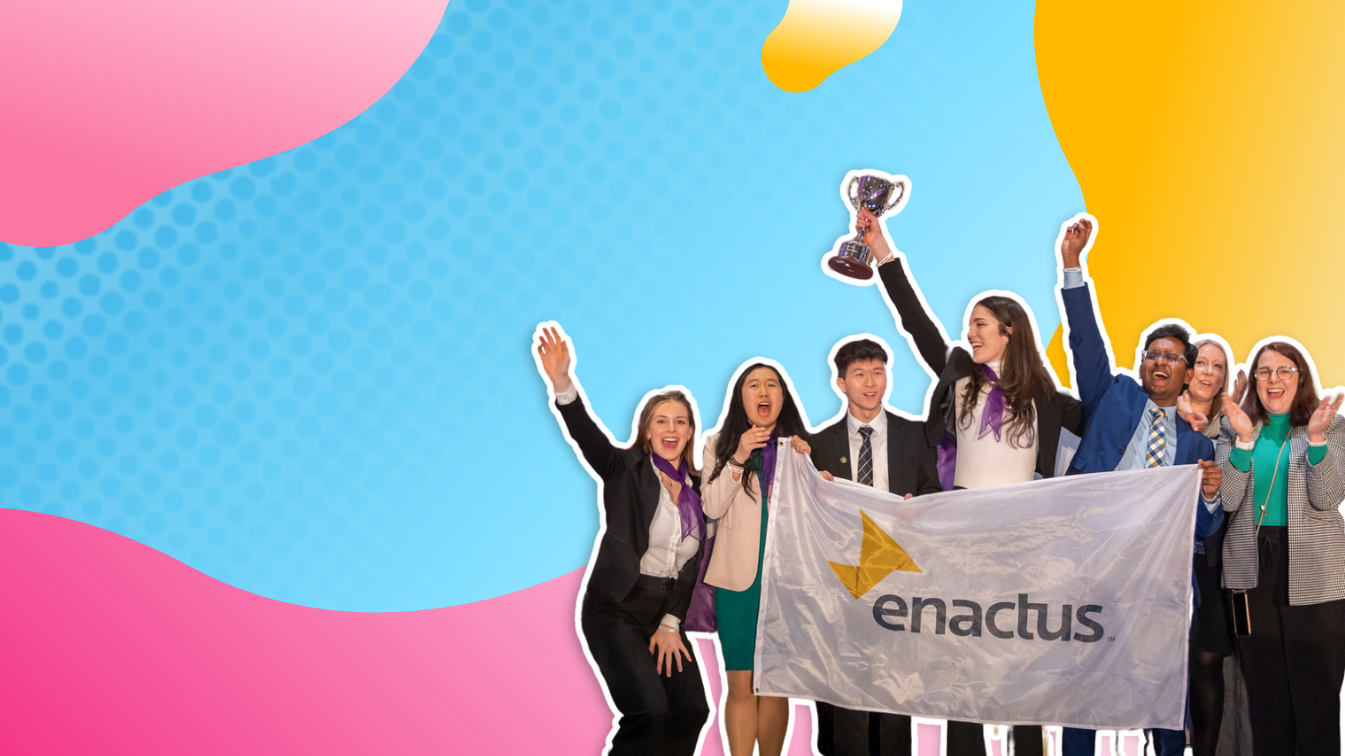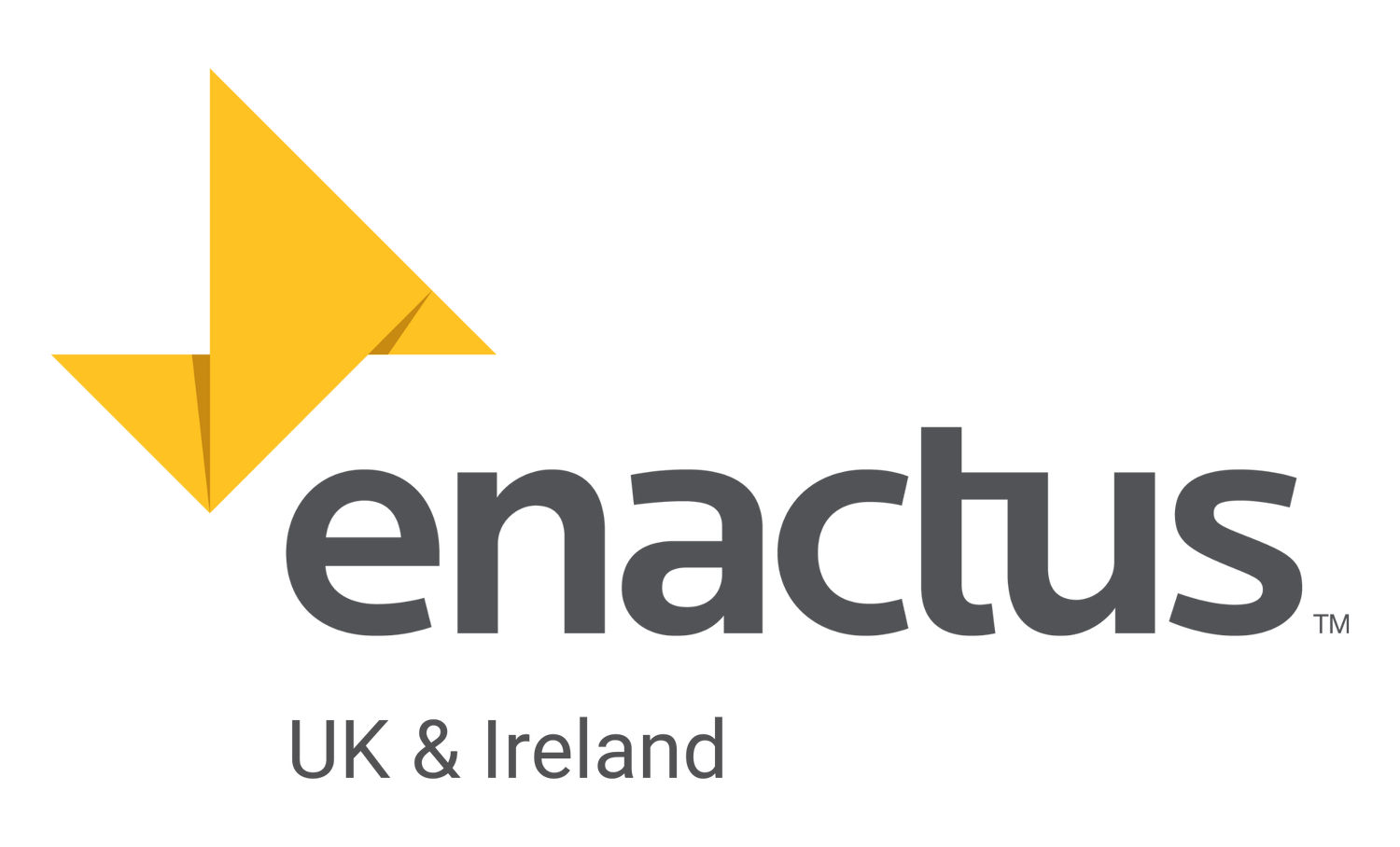
Regional Qualifiers 2025
The Enactus Regional Qualifiers are a series of mini competitions held across the UK and Ireland and are the first step towards the Enactus World Cup 2025 in Bangkok, Thailand.
Taking place from February 18th to 26th, these competitive events provide a platform for Enactus teams to showcase their impactful projects to a panel of judges. Excitingly, the top performers will advance to the Enactus UK & Ireland ‘s Top 16 Semi-Finals taking place on the 7th April, followed by a Top 4 Final on the 8th.
Eligibility: Only teams that participate in a Regional Qualifier are eligible to advance to the World Cup Qualifiers.
Competition: Teams present their projects to a panel of judges who evaluate them based on criteria such as innovation, social impact, and sustainability.
Advancement: The top 16 teams from the Regional Qualifiers will proceed to the World Cup Qualifiers taking place in April.

Regional Qualifier Competition Overview
Competition season is here, and your dedication over the past few months is about to shine! ⭐
At Enactus, we believe that competition fuels innovation and drives real-world change. For Enactus UK & Ireland this year, the Regional Qualifer competition is the first step in our competition season, which paves the road to the Enactus World Cup 2025!
The regionals are a great opportunity to receive feedback from business leaders, connect with peers, learn, collaborate, and, of course, celebrate your journey and efforts.
To ensure a fair competiton for all, teams must adhere to specific guidelines outlined by Enactus Global, which we have shared with you below. These guidelines cover various aspects, including project criterion, presentation format, and impact measurement. By following these guidelines, you'll be in the best postion possible to showcase your projects effectively and increase your chances of advancing to the Top 16, and potentially the Enactus World Cup!
Competition Guidelines
Presentation Team
A maximum number of 6 students may be in your core presentation team for Regional Qualifiers inc. the student responsible for your tech/presentation, who may join for Q&A. Each institution is permitted only one Enactus team.
Presentation Time-Slot
Each team will be given the same amount of time After the team has been formally introduced, your time-slot will be broken down as follows:
Set-Up Period - 1 minute
Each Enactus team will have a max of 1 minute to set up and check any audio-visual equipment. Once the team has set up, a plain black screen must be displayed.
OPTIONAL: Please note that only Annual Reports can be shared with judges. You may not give out any products, prototypes, or any other additional items.
Please note than you cannot give out any products, prototypes, or any other additional items
12 minutes (live presentations)
Each Enactus team will have a maximum of 12 minutes to deliver their presentation. Your presentation does not need to fill the full 12-minutes. You must end on a blank screen & you will be cut off if you go over this time.
5 minutes (question & answer period)
Each team has 5 minutes only to answer questions given by the judges in the room. Only those students in the core presentation team may answer questions. Only judges may ask questions. Please note that any unused time remaining from the 12-minute presentation will not be added to Q&A time.
Annual Report
For the Regional Qualifiers, annual reports are optional. Teams are welcome to bring a draft report for feedback.
If you are planning on bringing annual reports, you should make sure they include clear descriptions of your projects and target beneficaries and your programme impact.
The Annual Report can be made up of any confirguration of a max of four single-sided A4, or you can opt for double sided printing with a max. of 2 sheets of A4 used.
You should not crop or cut your annual report into a smaller size than what has been outlined above. You cannot use QR codes to extend your annual report beyond this size. If a team uses a cover or back page, it will count as one of those pages. Teams should not use folders, report covers, etc. in conjunction with their Annual Reports. Leftover reports will be recycled.
On the Day
Agenda Overview
Registration: Upon arrival, each team will register their attendance at the event before being shown to a designated area to wait in before we get started! Please note that late arrivals may jeopardise the teams ability to compete due to time constraints on the day.
Team Briefing: Whilst the judge briefing is taking place, a short team briefing for all competing teams will be given to run through the day and get you ready and excited about what’s to come!
Competition Time: Taking it in turns, each team will have the opportunity to present their 12-minute AV presentation followed by a 5 minute Q&A period.
Comfort Break
Competition Support Session(s): Following the completion of the competition portion of the day, Enactus UK & Ireland will then host a number of support sessions that will cover key topics such as ‘How to maximise your impact ahead of the Top 16’ and ‘How to set yourself and your team up for competition success’.
Close
** Please note that we are running 11 seperate Regional Qualifiers events meaning there are different start times and locations across the UK & Ireland which is why they are not included above. This information will be shared via email with your team directly.
-
A reliable laptop with a working HDMI port and your presentation preloaded/downloaded.
Laptop charger
Notepad/Pens to write on
Water Bottle
Recommended: Backup of Your Presentation! Have a USB or external drive copy in case of technical issues.
-
A projector, screen and HDMI cable (not type C)
Please note: Laptops, HDMI connectors and any other equipment needed for the presentation will not be provided by the competition management team. These must be arranged by the team before coming into the competition premises. Please note that this will also need to include a Mac converter if using an apple device.
-
In case of a power failure in the space, the competition will stop until the problem is fixed. If a team’s electronic equipment fails (i.e. laptop dies, presentation freezes, etc), the presentation time will continue to count down.
Top Tips
Judge Process
To make the most of your presentation, it's helpful to understand how the judges will be evaluating you. This section explains the judging process used in all competitions, including how judges are prepared for their role. This knowledge can help you tailor your presentation and increase your chances of success!
Judges recieve training on how to evaluate teams according to the competition’s criteria including both a virtual and in-personal judge orientation.
1
Judge
Orientation
Every judge must agree to the Judges Oath which is the same oath that is used across the World. With this, they commit to providing fair and quality assessments of the teams’ overall programme.
2
Judge
Oath
Introduced by the competition coordinator, each team will have 12-minutes to present their project to a panel of judges, followed by a 5-minute Q&A session.
3
Team
Presentation
During each presentation, judges use the Individual Team Evaluation Form (ITEF) to assess the quality and impact of teams’ initatives and score accordingly.
4
Team
Evaluation
After the completion of the Regional Qualifiers on the 26th, all scores will be reviewed, and the Top 16 will be announced.
5
Top 16
Announcement
Enactus Criterion
All Enactus Projects all over the world follow a simple framework that guides the creation of new and existing projects called the Enactus Criterion. It is used to evaluate your realised outcomes & direct impact at Regional, National and Global Enactus competitions.
Each team has the liberty to develop projects that adhere to the Enactus Project Criterion, beyond which the details — including the extent of team involvement, choice of beneficiaries, and approach to project implementation — are at your discretion.
Which Enactus team most effectively demonstrated entrepreneurial leadership to drive business and innovation for sustainable positive impact to benefit people, planet and prosperity within the last year?
(April 1st 2024 - April 1st 2025)
Entrepreneurial Leadership:
Identifying a need and capitalising on opportunities by taking personal responsibility, managing risk and managing change within a dynamic environment.
Innovation:
The process of introducing new or improving existing ideas, services, technologies, products or methodologies.
Use of Business Principles:
Applying a sound business model and business plan.
Sustainable Positive Impact:
Demonstrating a measurable, lasting improvement for people, the planet and prosperity.
*Prosperity - fulfilling lives economically and socially.
Measuring & Articulating Impact
When developing Enactus projects, it's crucial to understand the core impact we and our projects are creating for people, planet, and prosperity. Our focus at Enactus extends beyond merely meeting the criteria; we strive for positive, sustainable outcomes and clear direct impact.
To understand and judge how successful projects are, teams need to know and articulate clearly the difference between what they put in (inputs), what they produce (outputs), the positive changes they create (outcomes), and the wider impact they have (direct and indirect).
This framework will help you effectively communicate your project's impact to the judges and confidently present your project's reach in a compelling way, whilst importantly ensuring your claims are accurate and fair.
Impact Definitions
-
Inputs are the resources you invest in your project, like time, money, and skills.
-
Outputs are the immediate, tangible products of your efforts; think of activities or services your project delivers.
-
Direct Impact reflects the measurable improvements in knowledge, skills, or resources among individuals with whom the team directly worked. The immediate and measurable changes that happen to the people or organisations as a direct result of the teams’ intervention (not their project partners!).
Example: Trained 15 local seamstresses with upcycling techniques, pattern making, and fashion design.
-
Indirect Impact includes those who indirectly gain knowledge, resources, or skills — but with whom the team did not work with directly — contributing to broader improvements for people, planet, and prosperity.
Example: Indirect impact can be seen in the improved well-being of the families of the local seamstresses, who now experience increased financial stability due to their mothers' enhanced earning potential.
-
Projections show what might happen in the future, based on your current success. While helpful for showing long-term potential, judges will primarily focus on the actual impact you've achieved this year.
-
Reach measures exposure, not necessarily the effect your project had on those individuals. While reach is an important metric, it's crucial to remember that it doesn't directly translate to impact and therefore cannot be labelled as such.
Enactus Impact Audit
All Enactus Teams that make it through to the Top 16 Semi-Final Round will complete a pre-audit before competing. This ensures all teams adhere to the same standards when presenting their Enactus impact, creating a fairer competition for all.
More information about the pre-audit will be shared with all Top 16 teams, but to get a head start, we’d suggest you follow the Top Tips below!
Pre-Audit Top Tips
The term ‘audit’ might seem like a lot, but there is no need to worry - it's not about catching you out! Think of it as a chance to make sure you are clearly articulating the amazing work you have done, with passion and integrity.
Quite simply, if you use the Enactus impact guidelines and only claim impact you can prove with evidence, you're good to go.
Stay Organized: Keep all your project files (photos, videos, reports) in one place.
Track Your Impact: Record all impact with solid evidence.
Show Your Impact: Use numbers and stories to powerfully demonstrate how your projects helped people.
Communicate Clearly: Use the Enactus definitions to articulate your impact effectively.
Finally - Honesty is the best policy! Misrepresentation of project impact, even unintentional, can have serious consequences, including disqualification from the World Cup Qualifier. Don’t be that team…

